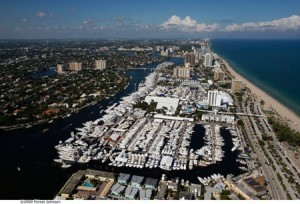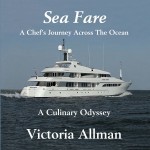Mike Jastrzebski's Blog, page 103
November 24, 2010
A cruising state of mind.
By Mike Jastrzebski
It's been 15 years since Mary and I bought Roughdraft. Before we moved aboard, we immersed ourselves in books about cruising. I read just about everything I could find on the subject and these books and articles made me feel like I couldn't wait to take off on this great adventure.
The reading was the easy part. Next came years of learning how to sail and refurbishing the boat. When we finally decided that it was time to leave, we had spent three years sailing the boat and five years preparing it for our journey. I can still remember the excitement of moving aboard, and the apprehension of leaving the dock in Minnesota for the final time. It was the end of October and the Marina had been closed for a week before we left. There would be no turning back. It was onward to warmer climates and out seven week journey was an unforgettable trip.
We always knew we'd have to go back to work. Our plan was to work for seven years and then we would take off for more exotic places. Well, those seven years has come and gone and we're now preparing to take off for two or three or more years. The problem is I'm having a little trouble reacquiring that cruising state of mind.
Maybe it's because I'm older, seven years will do that to anyone. Maybe it's because we've been living on the boat for seven years and we've become aware of the realities of two people living in small place. Maybe it's just because the reality that we're really leaving hasn't quite set in. Whatever the reason, I need a little help. If you have any ideas on how to get back into that cruising state of mind, let me know in the comments section.
November 23, 2010
Origins of Writers' Ideas
(Note to IRS: the above location is where writers legitimately go the get their ideas.)
Where do writers' ideas come from? In yesterday's blog, Michael Haskins had some real life examples. I'm thinking that it helps your craft mightily if you decide, as Michael did, to make your residence a sensory-stimulating place like Key West, Florida. For that matter, you might head to Mississippi or Louisiana if you want to really jump-start things. My brother has a house down there and whenever he fills me in on the latest from the small town of Natchitoches I know that Faulkner, Capote, and the other great southern writers were blessed by witnessing fantastic characters from the moment the delivery room MD slapped their baby bum.
But while some regions are more richly painted-in with characters and place, this does not fully get at the question of where we get our ideas. Like many writers, I struggle to answer the question. On the other hand, Stephen King did not hesitate when asked. In his book, On Writing, King wrote:
"Let's get one thing clear right now, shall we? There is no Idea Dump, no Story Central, no Island of the Buried Bestsellers; good story ideas seem to come quite literally from nowhere, sailing at you right out of the empty sky: two previously unrelated ideas come together and make something new under the sun. Your job isn't to find these ideas but to recognize them when they show up."
King also wrote about the idea of a story being a fossil that you uncover and in the process you work to reveal the story.
Stephen King is not alone in focusing on the concept of being ready when the creative idea is revealed. Earlier this year, PBS TV host Charlie Rose conducted an interview with singer-songwriter Neil Young. During the exchange, Young talked about always keeping his guitar nearby because he needs it when a song comes to him. When Charlie Rose probed for clarification, Neil Young said that he couldn't explain his creativity, but he knew he had to be ready when it came.
With this as a backdrop, I took great interest in reading an recent Bloomberg interview of John Scully, the former CEO of Apple. Scully described a meeting that took place between Apple's current CEO/creative genius, Steve Jobs and Edwin Land, the founder of Polaroid. Scully said the following on their meeting:
Dr. Land was saying: "I could see what the Polaroid camera should be. It was just as real to me as if it was sitting in front of me before I had ever built one."
And Steve said, "Yeah, that's exactly the way I saw the Macintosh." He said, "If I asked someone who had only used a personal calculator what a Macintosh should be like, they couldn't have told me. There was no way to do consumer research on it, so I had to go and create it, and then show it to people, and say now what do you think?"
Both of them had this ability not to invent products but to discover products. Both of them said these products have always existed—it's just that no one has ever seen them before. We were the ones who discovered them. The Polaroid camera always existed, and the Macintosh always existed—it's a matter of discovery.
So there you have it, at least for those folks. Of course, the idea is only the start. As the grand-master mystery writer Sue Grafton said, "Ideas are easy. It's the execution of ideas that really separates the sheep from the goats."
Origins of writers' ideas
(Note to IRS: the above location is where writers legitimately go the get their ideas.)
Where do writers' ideas come from? In yesterday's blog, Michael Haskins had some real life examples. I'm thinking that it helps your craft mightily if you decide, as Michael did, to make your residence a sensory-stimulating place like Key West, Florida. For that matter, you might head to Mississippi or Louisiana if you want to really jump-start things. My brother has a house down there and whenever he fills me in on the latest from the small town of Natchitoches I know that Faulkner, Capote, and the other great southern writers were blessed by witnessing fantastic characters from the moment the delivery room MD slapped their baby bum.
But while some regions are more richly painted-in with characters and place, this does not fully get at the question of where we get our ideas. Like many writers, I struggle to answer the question. On the other hand, Stephen King did not hesitate when asked. In his book, On Writing, King wrote:
"Let's get one thing clear right now, shall we? There is no Idea Dump, no Story Central, no Island of the Buried Bestsellers; good story ideas seem to come quite literally from nowhere, sailing at you right out of the empty sky: two previously unrelated ideas come together and make something new under the sun. Your job isn't to find these ideas but to recognize them when they show up."
King also wrote about the idea of a story being a fossil that you uncover and in the process you work to reveal the story.
Stephen King is not alone in focusing on the concept of being ready when the creative idea is revealed. Earlier this year, PBS TV host Charlie Rose conducted an interview with singer-songwriter Neil Young. During the exchange, Young talked about always keeping his guitar nearby because he needs it when a song comes to him. When Charlie Rose probed for clarification, Neil Young said that he couldn't explain his creativity, but he knew he had to be ready when it came.
With this as a backdrop, I took great interest in reading an recent Bloomberg interview of John Scully, the former CEO of Apple. Scully described a meeting that took place between Apple's current CEO/creative genius, Steve Jobs and Edwin Land, the founder of Polaroid. Scully said the following on their meeting:
Dr. Land was saying: "I could see what the Polaroid camera should be. It was just as real to me as if it was sitting in front of me before I had ever built one."
And Steve said, "Yeah, that's exactly the way I saw the Macintosh." He said, "If I asked someone who had only used a personal calculator what a Macintosh should be like, they couldn't have told me. There was no way to do consumer research on it, so I had to go and create it, and then show it to people, and say now what do you think?"
Both of them had this ability not to invent products but to discover products. Both of them said these products have always existed—it's just that no one has ever seen them before. We were the ones who discovered them. The Polaroid camera always existed, and the Macintosh always existed—it's a matter of discovery.
So there you have it, at least for those folks. Of course, the idea is only the start. As the grand-master mystery writer Sue Grafton said, "Ideas are easy. It's the execution of ideas that really separates the sheep from the goats."
Where do story ideas come from? Or, there's no shortage of ideas out there!
Michael Haskins
As a writer, I read newspapers and news magazines. It's as mandatory as reading and writing, as far as I'm concerned. I read these periodicals to stimulate ideas. I don't always spend time on the headline stories, but look for the short pieces that carry unusual news. You never know when something strange might kick your imagination into gear. I can read a piece from Alaska and ask myself, "what if, in Key West . . .?"
I also watch TV news, both the Miami channels, CNN and MSNBC.
I watched, as most of the world did, in horror a few years back as the bridge in the Twin Cities collapsed. It was caught, wide angle, on a surveillance camera. It looked like something out of a Bruce Willis Die Hard movie.
Of course, it wasn't entertainment. It was death of innocent men and women and destruction. Today the disaster is still affecting the lives of the people that drove over that bridge to go to work, to go out for dinner, to go on a date, to go home from picking kids up at day care. It is unimaginable.
Or is it?
It was a very visual event, both during and afterward. Maybe, because of the visual affect I thought of the movies instead of a book. I'm sure I am not the only mystery writer who watched the TV footage and wondered what kind of story could be built around the tragedy. It's what we do.
I don't know if I will use the incident, but we do have many bridges – one is seven-miles long – on the ride from Miami to Key West, so the possibility is there. Because of that accident, I follow news stories with reports about the condition of bridges throughout the United States.
An optimist might say the bridge collapse has forced state and federal transportation to look at bridges throughout the country. A pessimist might say it was a warning of our failing infrastructure, an unsolvable problem with the financial condition the country is in. I think most writers are, in their writing, pessimists because that's where the mayhem comes from. Optimists don't often commit mayhem; I don't like to say never. But I think you get my point.
So, is truth stranger than fiction?
I have a family friend who lives in Orlando and doesn't visit because of her phobia of driving over bridges in the Keys. I used to laugh at her phobia. I assumed that our bridges were safe because the government was looking out for our safety! After the collapse in the Twin Cities, the Monroe County government listed a number of bridges in the Keys that were in need of repair. The worst bridge in need of repairs in the county leads from my house to US1 and I drive over it daily. It was recently refitted. How long did that take? I don't even want to think of the other bridges out there, especially as I drive over them monthly on the way to a MWA function.
After the disaster in Minneapolis, I am beginning to wonder if government regulators and agencies do their jobs. Is the FAA really doing its job with the airlines? Traffic controllers? I'm having second thoughts. I don't fly. When I need to go to NYC, I drive and take my time, stopping on the way to see friends. I don't trust the airline management. They cut corners and, I fear, that maintenance is one of those corners. Check something every 100 hours, but now, maybe it's 115 hours. Could that little change be dangerous? Ask Qantas.
I am seriously thinking of driving to Houston and onto Southern California for my book signings. I have not met anyone recently that has flown and didn't have problems that are not worth confronting, as far as I am concerned. I'll drive, thank you.
Imagine a book that's premise is the demise of America through the failure of its infrastructure. Where would you begin it? With the roads and bridges? The airlines? Communications? The legal system?
When I open the morning paper now, my hands shake because what I am seeing is the origins of a great thriller and you and I are characters in it. Congress is inept at best; corrupt, in a worse case, and men and women who have not accomplished anything in years, even though the voting public told them to do something, seem to be in control.
The list goes on and on. I'm sure you can add to it from your city or county. I guess another thing reading and searching through newspapers teaches is that truth is stranger than fiction, it's unbelievable.
Where do your story ideas come from?
November 21, 2010
A day at the (Miami Book) fair.
By Mike Jastrzebski
I went to the Miami Book Fair Saturday. This was my second time going to the fair. Mary and I went there two years ago. Since Mary had to work I went by myself. I figured that since we are going cruising this March, this would be my last chance to experience the fair.
I went to several of the forums. Walter Mosley was interesting. I've enjoyed his Easy Rawlins books, but I don't think I'll be buying his new book. He did a reading and he writes fantastically, but the subject of his new book, The Last Days of Ptolemy Grey
was interesting. I've enjoyed his Easy Rawlins books, but I don't think I'll be buying his new book. He did a reading and he writes fantastically, but the subject of his new book, The Last Days of Ptolemy Grey , is
, is
Alzheimer's. This subject is a little too depressing for me. Still, I'm glad I got a chance to hear him speak and read.
Jeff Lindsay, the author of the Dexter books, was interesting and humorous, and as always, I enjoyed listening to James W. Hall
the author of the Dexter books, was interesting and humorous, and as always, I enjoyed listening to James W. Hall , one of my favorite mystery writers.
, one of my favorite mystery writers.
The reason I went on Saturday was because Mystery Writers of America has an all day track and I know a lot of the writers that were speaking. It gave me a chance to visit with friends and as usual when writers gather nowadays, the talk turned to e-books.
There is no doubt among writers that e-books have become an important part of book selling. Where there is no consensus is how important. The book fair is still a paper book gathering. Bookstores, publishers and self-published writers have purchased booths trying to lure the reader into buying their goods. To my surprise one self-published writer who had paid for a booth to showcase his book turned up his nose when I asked him if the book was available on Kindle. If the price was right I was willing to give the book a try but his comment to me was, "I don't believe in digital books."
I was startled by his comment; after all, between The Storm Killer and Key Lime Blues
and Key Lime Blues , I've sold nearly 1900 e-books since July. I guess I should have told the guy that not believing in something doesn't mean it doesn't exist.
, I've sold nearly 1900 e-books since July. I guess I should have told the guy that not believing in something doesn't mean it doesn't exist.
I wonder what the book fair will be like in 2 or 3 years when 50% of books sold are e-books, because if I were a betting man I'd bet the figure will be at least 50% by then. What do you think?
November 18, 2010
Sailing, Simplicity and Technology
"Go confidently in the direction of your dreams. Live the life you have imagined. As you simplify your life, the laws of the universe will be simpler." —Henry David Thoreau
We sailors often like to insist that we have chosen our sailboats because of some aesthetic of simplicity — we're following nature, just blowing along with the wind. But when you look closely at any sailboat, even one based on a design from hundreds of years ago, anyone can see they represent some very complex technology. I must admit, that is part of what I love about sailing: the skill, the art, the secret knowledge.
I am drawn to the ideas and concepts of self reliance and the voluntary simplicity movement. There are days when I feel as though I live on a treadmill set at a pace just above that which I can manage and it takes all my strength to try to keep up. I want to simplify, slow down, savor each day instead of getting whiplash watching them fly by. I like the idea of using fewer resources, leaving a smaller carbon footprint, indulging less in our materialistic society.
So then, how is it I can justify my love and lust for technology? If I believe in simplicity, shouldn't I be a Luddite — against all forms of technology? I don't think so. My inner geek believes there is such a thing as appropriate technology. Is that merely justifying this contradiction? Maybe. But the bow and arrow is technology and it meant that early man didn't have to get as dangerously close to his prey in order to put food on the fire. Today, the Internet can allow telecommuting that will free people from the need to commute on the highway to their workplace — or even allow them to work from a distant anchorage. New battery technologies, solar panels and wind generators can allow cruising sailors to put fewer hours on engines and generators. Ebooks don't require paper mills, printing presses, ink or trucks to transport them across the country. And on a dark night's passage at sea, how I would live to have AIS, GPS, electronic charts, and radar.
Okay, but my iPad? Appropriate technology or rampant consumerism? Given my work as a writer, blogger and online teacher, it has saved me this week. Last Saturday, I moved my boat back to my super-cheap annual dock at the condo complex where I cannot live aboard, and I moved myself and Chip, the Intrepid Seadog, into a tiny studio not much bigger than my boat. I intend to be a land lubber for the next six months — which is a necessary evil or I will lose my slip. I have been trying to get Internet in the studio here for a week, and I learned tonight it's now been rescheduled for Wednesday. My iPad has been my sole connection at home for student emails, and tonight I intend to post this blog, photos and all, via the iPad. This lovely piece of technology has made my life simpler. And I can't wait to take it with me in the direction of my dreams.
Fair winds!
Christine
November 17, 2010
A perfect day!
By Mike Jastrzebski
I don't want to rub my northern friends' noses in it (well maybe a little) but Wednesday was a perfect day. Eighty degrees, a bit of a breeze, not a cloud in the sky.
I should have been working on the rewrite of Dog River Blues, but instead we spent the morning at the beach. Mary normally works on Wednesdays, but last night she received a call telling her it was slow at the spa and she should take the day off.
So we arrived at the beach about 9:30 a. m., set up our chairs under the palm trees across from St. Bart's coffee shop, and proceeded to do nothing while eating chocolate chip muffins and drinking iced coffee. We always bring an extra chair for company, and we sit and Mary watches the ocean while I people watch. Now you have to understand that we do this on a regular basis, we do the same thing most Mondays and Tuesdays when Mary is off from work. What made today special was that it was unexpected.
We hope that this will soon became the norm. Mary is going to retire this spring and once we start cruising we may just get tired of sitting and enjoying the ocean (okay, probably not) but for now it feels slightly decadent to have an extra day on the beach.
So for those of you who are shivering in Minnesota or Michigan or Wisconsin, we tilt our iced glasses to you, and for those of you who live down here in Florida, we suggest you call in sick and get yourselves out to the beach.
A Day on the Water
Last week was the Ft. Lauderdale Boat Show. This is one of the few times that people can come aboard and tour private yachts. It was as I was touring Mike and Mary through our main salon that I realized how different yachting is from other boats on the water.
With that in mind, I thought I would use today's post to describe a day in the life of a yacht chef.
"We're on diets. We don't eat butter, sugar or red meat," the already anorexic looking wife declared as she stepped aboard. She pushed her Prada sunglasses onto her platinum blond hair, expertly pinning the curls off her face. She waved a slender hand in my direction as if she were waving off a fly. The weight of a marble-sized diamond rotated to one side on her skeletal finger. "We'll have salad with just lemon juice and egg whites for lunch."
I nodded. There goes my creativity. But, they were the guests and I was there to cook for them.
When I placed the food in front of them, the man curled over his plate to inspect the meal, amplifying the roundness of his stomach. He picked up his fork and lifted the egg whites. He looked underneath and then at his wife.
"Where's the meat?"
I stared blankly. Meat? His wife had ordered egg whites for both of them. I looked to her for an answer. She studied her French manicure silently. It only took me a moment to recover.
"I'm sorry, I misunderstood. What can I get for you?"
He pushed the plate in front of him away with one hand and curled his lip in a snarl. "Steak and fries, a side of béarnaise."
I guess they weren't both on diets. I flew down the stairs to the galley.
"Can you light the barbecue?" I called to our deckhand as I passed him in the corridor. "Now!" I added.
I pulled the steaks I had bought for the crew from the fridge. We would have to go without. I scrambled quickly to heat the oil for deep-frying. My knife flew through two potatoes to cut matchsticks as I gently, yet with furor, warmed the butter for the sauce.
"Can I do anything?" Chloe our chief stew asked.
"Just stand back and watch the show." Patrick, the captain said. He knew I could handle last minute requests, this wasn't the first one I had had, but it still didn't make them any easier.
I thrust the platter with tenderloin into his hands. "You're now my grill guy." I felt like I was back in a restaurant armed with prep-cooks and apprentices. "Cook this medium-rare."
I pivoted on one foot to Chloe. "He'll need ketchup and Dijon mustard." She turned to grab the dishes as I called after her, "and a pitcher and ladle for the sauce."
I smiled to myself. Patrick may have been right, I did like the adrenalin rush of last minute requests.
It wasn't long before I had another whole meal plated and ready to go. Chloe carried the plate and I followed with the sauces.
"Just a bowl of blueberries for dessert," the wife had told me earlier.
"Got anything chocolaty back there?" The man questioned as I placed his plate in front of him.
I bolted to the galley to beat egg whites. The muscles in my forearm burned like searing steak. I grated chocolate, my hands moving as fast as shaking a tambourine. I selected the smallest ramekin I could find to quicken the cooking process and popped the cake in the oven.
They were those guests. The couple who cannot agree. One tells you one thing and the other expects something else. It is a power struggle just to decide on a day's events.
"I want to go to the beach." The wife says, already dressed in her size zero bikini that accentuates her legs.
"No, we're going diving.' He says thrusting a chubby fist into a bowl of jellybeans.
"Dinner will be at 7:00." She asserts.
"I'm not eating until ten." He states.
I could barely keep up with the carousel of plans. One says they are eating out, the other refuses to go. Round and round the game went. The days stretched longer and the requests became crazier, but that is what we were there for. We are there for the guests and no request is too crazy, no plan too unobtainable. In yachting, you rarely say no.
This is a typical day on the water for me. What about you? How do you spend your days on the water? What is the craziest thing you have had to do on your boat?
Victoria Allman has been following her stomach around the globe for twelve years as a yacht chef. She writes about her floating culinary odyssey through Europe, the Caribbean, Nepal, Vietnam, Africa and the South Pacific in her first book,
Sea Fare: A Chef's Journey Across the Ocean, available through Barnes and Noble and Amazon.
Victoria is a columnist for Dockwalk, an International magazine for crew members aboard yachts. Her column, Dishing It Up, is a humorous look at cooking for the rich and famous in an ever-moving galley.
You can read more of her food-driven escapades through her web-site, www.victoriaallman.com
November 15, 2010
These Writers Aren't Crazy — They're Just Sailors
by Tom Tripp
Two recent posts by Mike and Christine have lamented the cramped confines of fictioneers afloat. I was feeling all sympathetic and sad for my fellow scribes until it dawned on me that they're complaining about the spaces aboard SAILBOATS. Well of course they're cramped! "Cramped" is another word for sailboat! Jeepers. If they really want to spread out and write in the lap of luxury, they have to move aboard a trawler. (Have I mentioned that my day job is writing about trawlers and other power cruising boats?).
Here's the deal with a trawler. It has some of the same stuff that a sailboat has, except for all that mast and sail and rigging stuff. It has a diesel engine and it goes about as fast as a gentle breeze, just like a sailboat. BUT, here's the kicker, it has LOTS of room and, depending on how big a trawler you buy, you can dedicate an entire stateroom to the business of writing.
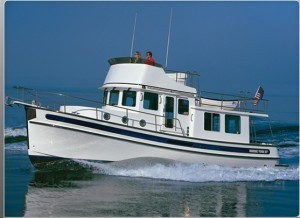
Nordic Tug 37 Has Room for a Writer
Here's one I think would work well for Mike and Mary — the Nordic Tug 37. It's got a nice full-size salon with lots of windows to let the sunlight illuminate any manuscript. It's got a nice owner's stateroom forward and a real head with a separate toilet and shower (that sounds imperative to me). It'll travel 7 knots or 17 if you really want to get somewhere quickly. It's got a salty look that says "TUG" and that's worth all the conversation it starts on the dock. (Okay, Seychelle would have turned up her nose at the fiberglass and ultraleather, but still…).
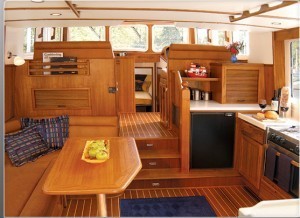
Nordic Tugs 37 Salon
Mike and Mary would be able to find everything they had stored aboard in just seconds. And if the diesel decided it needed a new filter or plugs or something you could easily tackle the task without having to hire an ex-Russian gymnast to fit into the space between the bilge and the deck just to take proper care of the machinery.
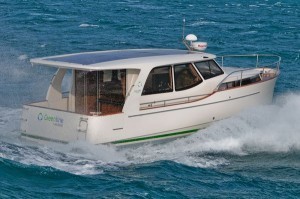
Greenline 33 Solar Hybrid Cruiser
Ah, and for Christine I have JUST the right new boat. It's a new one from a Slovenian builder and it will cruise as fast as a slow sailboat while using absolutely NO FUEL. The Greenline 33 is a solar hybrid that can use a large deckhouse roof collection of solar panels to charge the lithium-polymer batteries while at anchor. This boat, too, will race along in the teens if it has to, but if you resist the urge to race, you can make a single tank of fuel last an entire cruising season, with more than a 1,000-mile range available to you.
How about you? Can I help you find a roomy alternative to that oh-so-romantic but bloody cramped sailboat for your dream writing space?
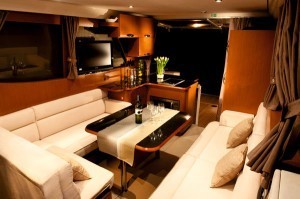
Salon and Aft Galley Open to Cockpit on the Greenline 33
The Greenline 33 also has a nice lower galley/dinette and a spacial and airy salon in which to set up the tablets and chisels. The hybrid diesel, built by Volkswagon Marine, has a combined generator/electric motor connected to it that can either charge the batteries when the diesel is running, or turn the prop with all the torque and efficiency of a DC electric motor.
So why does anybody live aboard a sailboat when they can live aboard a much more spacious trawler or similar cruising powerboat? In a word, price. A used Nordic Tug 37 will run you anywhere from $225K to $325K, depending on age and equipment. A new Greenline 33? That's less than $300K with a fairly high standard of equipment and decor.
November 14, 2010
Are we crazy?
By Mike Jastrzebski
By we I mean those of us who live on boats. I started thinking about this after reading Christine's blog Friday about the space she writes in. It's small. It's crowded. It's cramped. So is my writing space. In fact, those three words–small, crowded and cramped apply to every aspect of living on a small boat.
Take the head for example. Our head is about the size of a porta-potti. Not only does this space serve as the head, but it's also the shower. And talking about the shower, we carry just 65 gallons of water, so when we're cruising Mary and I use about two gallons of water each to shower.
Then there's our sleeping quarters. We live on a 36-foot boat so there is no bedroom as such. We sleep on the front v-berth. This sleeping area is as wide as a king size bed at the top and about as wide as a baby crib mattress where our feet rest. We have to climb up three feet to get into the berth and we can barely sit up without hitting our heads. We have friends who live on 42-50 foot boats and the sleeping situation is a little better, but only marginally.
Finally there's the storage, or maybe I should say the lack of storage. It drives me nuts that whenever I want something it's hidden behind two or three things that I don't need. One of the reasons I bought a Kindle and plan to buy another one for Mary is that I no longer have to store books on board. We have a lot of things stored in the trunk and the back seat of our car and I cringe to think about fitting those things on board when we take off next spring.
Don't get me wrong now; there are a lot of great things about living on a boat. Beautiful sunrises, great beaches, like-minded friends who may also be crazy.
So what do you think? Are we crazy? Just a little different? Or maybe we're just adventurous?


